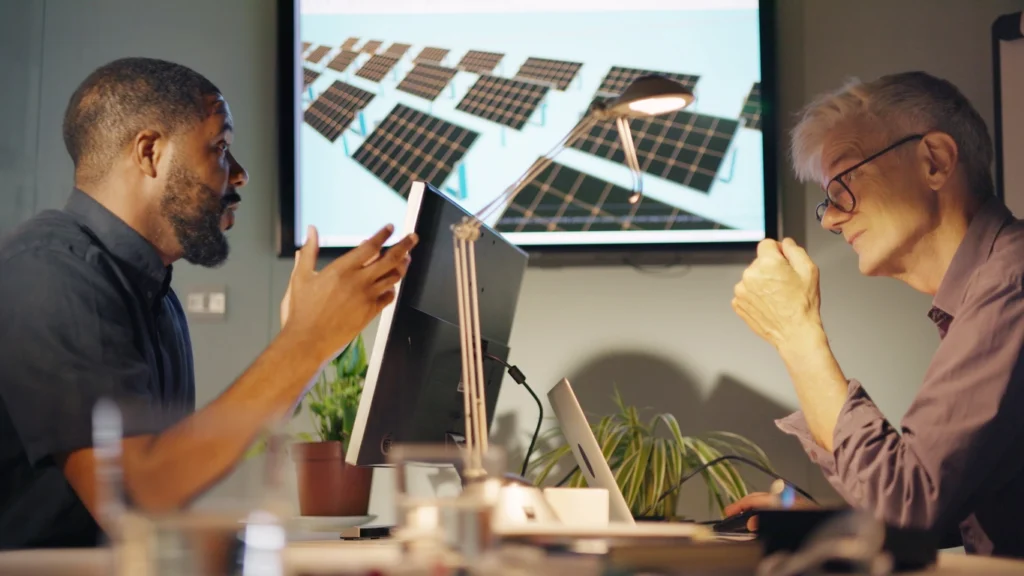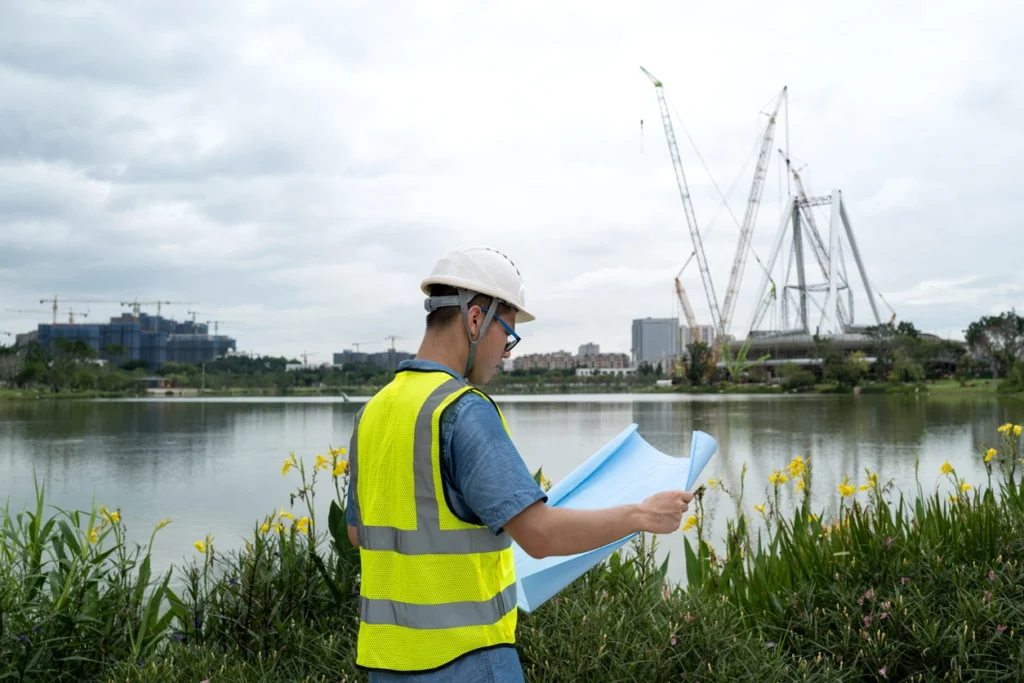Environmental consultants are experts who help businesses, governments, and organizations navigate the complex world of environmental regulations and sustainability. They play a crucial role in balancing economic development with the protection of our planet. Think of them as environmental detectives – they assess problems, uncover solutions, and guide clients towards practices that minimize their impact on the natural world.
The work of environmental consultants is wide-ranging, but some of their core tasks include:
- Environmental Assessments: Examining sites or operations to identify potential environmental risks or impacts, such as soil contamination, water pollution, or air quality issues.
- Compliance Assurance: Helping clients understand and comply with a host of environmental laws and regulations at the federal, state, and local levels.
- Problem-solving & Remediation: Developing strategies to clean up contaminated sites, manage waste, or reduce emissions in cost-effective and sustainable ways.

The Value They Bring
Businesses and organizations hire environmental consultants for several key reasons:
- Expertise: Environmental regulations are complex and ever-changing. Consultants offer specialized knowledge that helps clients stay ahead of the curve.
- Risk Mitigation: Consultants identify potential environmental liabilities and help clients avoid costly fines or damage to their reputation.
- Sustainability Leadership: Consultants guide clients in adopting sustainable practices that not only benefit the environment but can also improve efficiency and attract environmentally-conscious customers.
Types of Consulting
Environmental consulting encompasses various specializations, including:
- Air Quality: Measuring air pollutants, developing emissions control plans, and ensuring compliance with air quality standards.
- Remediation: Cleaning up contaminated sites such as former industrial areas or hazardous waste dumps.
- Sustainability: Assisting with green building design, energy audits, and development of long-term sustainability plans.
- Environmental Impact Assessments: Evaluating the potential environmental consequences of proposed developments or projects.
The Path to Becoming an Environmental Consultant
There’s no single route to enter this field, but certain educational experiences and skillsets are highly sought-after.
Educational Background
- Common Majors: Most environmental consultants start with a bachelor’s degree in:
- Environmental Science
- Environmental Engineering
- Biology
- Chemistry
- Geology
- Public Policy (with an environmental focus)
- Essential Skills: Strong coursework in science, mathematics, and problem-solving is crucial for the analytical nature of the work. Communication skills, both written and verbal, are also important for writing reports and interacting with clients.
Postgraduate Options
- When to Consider a Master’s: A master’s degree, like an MS in Environmental Science or Environmental Management, can be a significant asset, especially for specialization or career advancement. It may also open doors to higher-level roles and consulting firms.
- Benefits: Advanced degrees provide deeper knowledge and research experience, making graduates highly competitive in the job market.
Work Experience
- Internships: Gaining hands-on experience through internships is invaluable. Look for opportunities with consulting firms, government agencies, or environmental nonprofits.
- Entry-level Roles: Starting in a field technician or research assistant position builds practical skills and knowledge of environmental regulations.
- The Importance of Fieldwork: Experience with sampling, data collection, and site assessments gives consultants a solid foundation for understanding real-world environmental challenges.
Transitioning from Other Fields
- Transferrable Skills: Individuals from engineering, construction, or even business backgrounds can successfully transition. Highlighting skills like project management, data analysis, and regulatory knowledge are key to demonstrating your value to potential employers.

Essential Skills for Environmental Consultants
Environmental consultants need a strong mix of technical expertise, excellent communication abilities, and a problem-solving mindset.
Technical Knowledge
- Environmental Regulations: Deep understanding of environmental laws at local, state, and federal levels. This may also include international regulations like ISO standards if working with multinational clients.
- Scientific Principles: A solid grasp of biology, chemistry, ecology, and related fields is crucial for assessing environmental impacts, interpreting data, and developing solutions.
- Assessment Methods: Proficiency in standard sampling techniques, laboratory analysis, and field monitoring procedures.
- Data Analysis & Tools: The ability to use statistical software, GIS mapping tools, and modeling programs to turn raw data into meaningful insights.
Communication and Collaboration
- Report Writing: Clearly and concisely present complex findings in reports tailored for various audiences (technical experts, clients, or the general public).
- Client Interactions: Consultants work directly with clients. Strong interpersonal skills, professionalism, and the ability to explain technical concepts in simple terms are essential.
- Cross-functional Collaboration: Projects often involve engineers, scientists, lawyers, and policymakers. Environmental consultants must work effectively within these teams.
Problem-solving and Adaptability
- Unexpected Challenges: Environmental projects often encounter unforeseen issues. Consultants need to think on their feet and adjust plans accordingly.
- Finding Creative Solutions: Developing innovative approaches that balance environmental protection, regulatory compliance, and the client’s budget and goals.
- Critical Thinking: Analyzing information objectively, identifying patterns, and making sound, evidence-based recommendations.

A Day in the Life: Project Examples
Site Assessment
- Scenario: A developer plans to build on a former industrial site. The consultant is tasked with assessing potential contamination and risks.
- What’s Involved:
- Historical research on site usage
- Developing a sampling plan (soil, water, etc.)
- On-site collection of samples following strict protocols
- Laboratory analysis to determine contaminant levels
- Data interpretation and comparison to regulatory standards
- Report with findings and recommendations for further action
Remediation Plan Development
- Scenario: A contaminated site needs to be cleaned up for safe redevelopment.
- Steps:
- Characterizing the nature and extent of contamination
- Evaluating different cleanup technologies (excavation, soil treatment, etc.)
- Considering factors like cost, effectiveness, and long-term sustainability
- Collaborating with engineers, remediation specialists, and regulatory agencies
- Developing a detailed plan with timelines, budgets, and safety protocols
Regulatory Compliance Audit
- Scenario: A manufacturing facility needs to ensure it is meeting all environmental regulations across its operations.
- Process:
- Thorough review of applicable laws at all levels (federal, state, local)
- On-site inspection of facilities, equipment, and waste management processes
- Interviews with personnel to understand procedures and potential loopholes
- Comprehensive report outlining compliance status and areas for improvement
- Working closely with the client to develop corrective action plans
Sustainability Consulting
- Scenario: A company seeks to reduce its carbon footprint and improve resource efficiency.
- Measuring Impacts: Calculating greenhouse gas emissions, water usage, and waste generation to establish a baseline.
- Green Initiatives: Recommending strategies like:
- Energy efficiency upgrades and renewable energy sources
- Water conservation and recycling programs
- Sustainable sourcing and waste reduction initiatives
- Creating a long-term sustainability roadmap with measurable goals
- Helping with communication of sustainability efforts to stakeholders
Each day can be different for an environmental consultant. Some days are in the field, others are focused on analysis or report writing, and still others involve collaborating with clients or agencies.
Environmental Consultants: Shaping a Sustainable Future
Environmental consultants are the bridge between compliance, environmental protection, and sustainable business practices. Their expertise, adaptability, and dedication to finding solutions help clients address complex challenges. As the push for sustainability intensifies, the demand for skilled environmental consultants will only grow. This field offers a fulfilling career for those seeking to combine science, problem-solving, and a commitment to protecting our planet’s future.
Frequently Asked Questions About Environmental Consultants
Do environmental consultants work with communities impacted by pollution or environmental issues?
Yes! Consultants often play a crucial role in addressing environmental justice concerns. They may conduct assessments in communities facing disproportionate environmental burdens, help design solutions, and communicate potential risks and remediation plans to residents in a clear and transparent way.
What are some ethical challenges faced by environmental consultants?
Consultants may face situations where the client’s interests conflict with optimal environmental solutions. It’s crucial to maintain integrity, disclose potential conflicts, and advocate for the most ethical and sustainable choices, even if they aren’t the most immediately profitable for the client.
How can environmental consultants stay up-to-date on the ever-changing landscape of regulations?
Consultants dedicate significant time to continuing education. They attend conferences, participate in professional organizations, read industry publications, and may pursue certifications to ensure their understanding of the complex regulatory environment is current.
Are there opportunities for travel in environmental consulting?
Absolutely! Depending on the specialization and the firm, consultants might travel to different sites within a region, across the country, or even internationally for project assessments, audits, or remediation work.
What are some emerging trends and technologies shaping the future of environmental consulting?
Technologies like drones for remote site assessment, advanced sensor networks, and data analytics are becoming more prevalent in the field. Consultants will need to adapt to incorporate these tools effectively, and there’s a growing focus on areas like climate change adaptation and circular economy consulting.